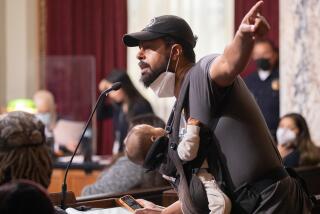Thwarted Developer to Sue Thousand Oaks
After a dozen years of being stymied by Thousand Oaks officials, a Los Angeles developer plans to sue the city for $10 million, using a judge’s ruling that officials acted illegally in blocking him from developing his land.
Although Nedjatollah Cohan lost a lawsuit last week against the city to develop his 47-acre parcel in Newbury Park, the judge in the case agreed that the city violated local and state laws in appealing the city Planning Commission’s decision favoring the project.
Cohan believes the Superior Court ruling gives him the legal ground to sue the city for damages, said R. David DiJulio, the developer’s attorney.
“The city has won the battle, but it’s going to lose the war,” DiJulio said.
DiJulio said he plans to file a motion within the next two weeks to both appeal the judge’s ruling and seek damages from the city for what he called “reverse condemnation.”
“Essentially, the city has taken the Cohan property as parkland” in that the land has gone unused by his client, DiJulio said. “This represents the lost profits of the Cohans for not developing their property.”
But Thousand Oaks City Atty. Mark Sellers said Cohan doesn’t have a case. He said the developer cannot ask for damages or loss of profits from a project whose denial has been upheld in court.
“If his client doesn’t have entitlement to build this project, how can he ask for damages?” Sellers said. “It just sounds like a lot of saber rattling to me.”
But DiJulio argued that the judge found that his client’s development rights were violated by the City Council when it voted to appeal his project and so he has every right to ask for damages.
On Friday, Ventura County Superior Court Judge Melinda Johnson upheld the council’s decision to reject Cohan’s housing and shopping center complex. The project would have been built on the 47 acres at the southwest corner of Erbes Road and Kimber Drive.
In her ruling, Johnson said the council had violated local and state laws when it voted July 7 to review the Planning Commission’s decision approving the Cohan project. The council later voted down the development.
Specifically, the ruling said the council, acting as one body, broke the city’s municipal code by appealing the Planning Commission decision to itself. Johnson said only individual council members, members of the public or designated public agencies can appeal a Planning Commission decision to the City Council, after paying the appropriate filing fee.
Johnson’s ruling stated that the council also violated California’s Brown Act for voting on an item that had not previously been placed on its agenda.
Nonetheless, Johnson said she believed even if the council had not appealed the Planning Commission decision, another party would have and the outcome would have been the same.
Johnson’s ruling left open the issue of damages that the city might have to pay Cohan for blocking him from developing his property, DiJulio said.
Sellers said Cohan has the right to develop his property, just not the commercial project he has proposed. He said if Cohan wants to file another development proposal that calls for a strictly residential project, he has that right.
Council members Elois Zeanah and Frank Schillo agreed, saying the project proposed would be too densely developed and the commercial portion inappropriate for the area. Both pointed out that the project would be built on a flood plain and said it would have a significant impact on a nearby wetland area.
Schillo said if Cohan appealed the judge’s ruling, it would only mean that he would have to wait even longer to develop his property.
“If he wants to wait 10 years, that’s fine with me,” Schillo said.
More to Read
Start your day right
Sign up for Essential California for news, features and recommendations from the L.A. Times and beyond in your inbox six days a week.
You may occasionally receive promotional content from the Los Angeles Times.






